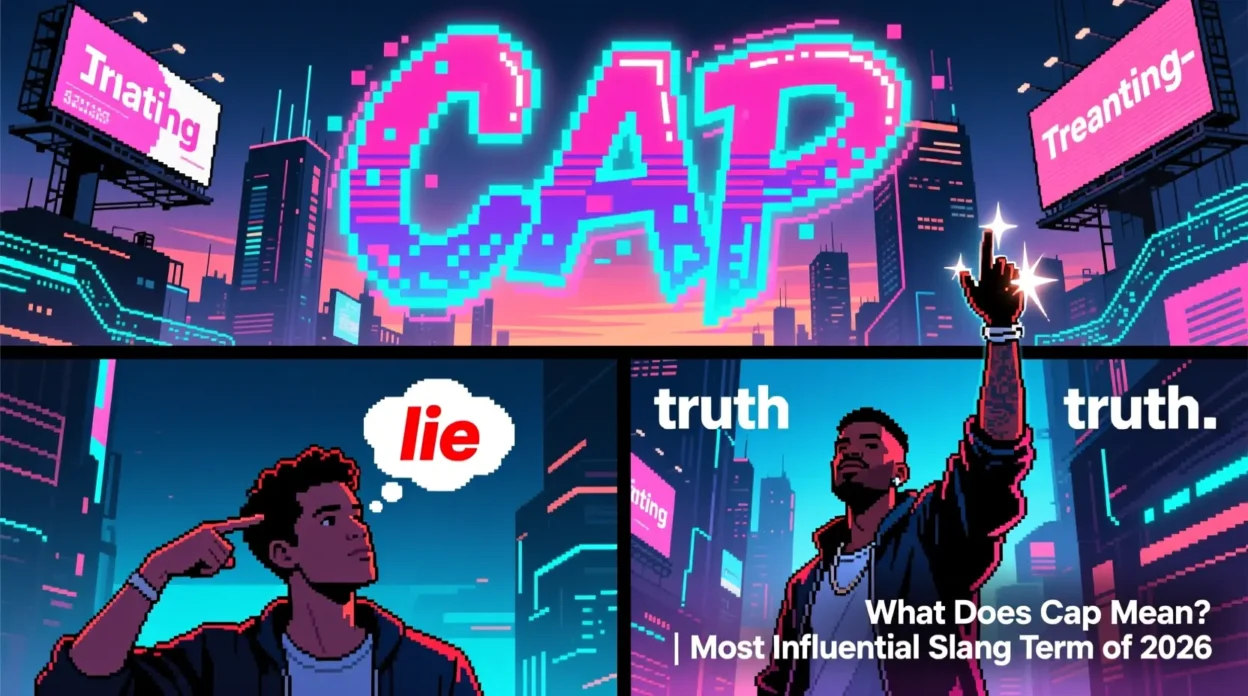The first time I saw someone comment “that’s cap” on a TikTok video, I stared at my screen like I had missed an entire chapter of the internet. Was it about hats? Fashion? Baseball?
After seeing it everywhere—Snapchat, Instagram comments, group chats—it finally hit me that everyone seemed to know what it meant… except me.
So if you’re here because someone told you “stop capping” and you’re wondering whether to be offended or confused, you’re in the right place.
Quick Answer: Cap means “lie” or “false.”
It’s a casual, slangy way of saying “that’s not true” or “you’re lying.”
🧠 What Does Cap Mean in Text?
In texting and social media, “cap” is an informal slang word that means a lie, exaggeration, or something untrue.
When someone says “that’s cap,” they’re saying “that’s a lie.”
When someone says “no cap,” they mean “I’m being honest” or “for real.”
Example:
- “He said he can lift 400 lbs… that’s cap 😂”
In short:
Cap = Lie = Something false or exaggerated.
📱 Where Is Cap Commonly Used?
You’ll see cap all over casual online spaces. It’s especially common in:
- 📱 Text messages
- 🤳 TikTok comments & videos
- 👻 Snapchat
- 🧑🤝🧑 Group chats
- 🎮 Gaming chats (Discord, Xbox, PlayStation)
- 💬 Twitter/X
Tone level:
- ❌ Not formal
- ✔️ Very casual
- ✔️ Social-media friendly
- ✔️ Often used playfully or jokingly
💬 Examples of Cap in Conversation
Here are realistic texting-style examples so you can see how “cap” is used in real chats:
1
A: i only slept 2 hours last night
B: cap 😭
2
A: bro i’m actually 6’4
B: that’s cap and u know it 💀
3
A: she said she didn’t see my text
B: LMAO capppp
4
A: i swear i’m not talking to anyone else
B: no cap?
A: no cap.
5
A: i’m on my way
B: cap. u always late 😒
6
A: this test was EASY
B: big cap 😂
7
A: i didn’t eat your fries
B: CAP. the bag literally empty 😭🍟
🕓 When to Use and When Not to Use Cap
✅ When to Use “Cap”
Use it when things are:
- Casual and friendly
- Joking or playful
- Online or in group chats
- Among people your age
- When someone is obviously exaggerating
❌ When Not to Use “Cap”
Avoid it when things are:
- Professional or work-related
- In emails
- With teachers, bosses, or clients
- In serious or emotional conversations
- When honesty and clarity really matter
Comparison Table
| Context | Example Phrase | Why It Works |
|---|---|---|
| Friend Chat | “that’s cap 😄” | Casual & funny |
| Work Chat | “That doesn’t seem accurate.” | Professional & respectful |
| “Please clarify this point.” | Formal & clear | |
| Group Chat | “bro stop capping 😂” | Playful, social-media tone |
| Serious convo | “Are you sure?” | Neutral & considerate |
🔄 Similar Slang Words or Alternatives
| Slang | Meaning | When to Use |
|---|---|---|
| No cap | No lie / seriously | When you’re being honest |
| Fr | For real | Anytime you want to confirm truth |
| Bet | Okay / I believe you | Casual agreement |
| Fax | Facts / true | When you strongly agree |
| Bruh | Expression of disbelief | When something seems ridiculous |
| BS | Nonsense / lie | Informal but slightly stronger tone |
❓ FAQs:
1. Is “cap” rude?
Not usually. It’s casual and can be playful, but in some contexts calling someone a liar might sound blunt.
2. Does “no cap” mean the opposite?
Yes! No cap = no lie = for real.
3. Is “cap” used by all ages?
Mostly teens and young adults, but it’s become mainstream thanks to TikTok and memes.
4. Can I use “cap” in a professional setting?
No. Avoid it in emails, work chats, or formal situations.
5. Where did the word “cap” come from?
It originally appeared in African American Vernacular English (AAVE) and became widely popular through hip-hop culture before spreading to social media.
6. Is “cap” always negative?
No—sometimes it’s used jokingly to tease friends, not accuse them of serious dishonesty.

